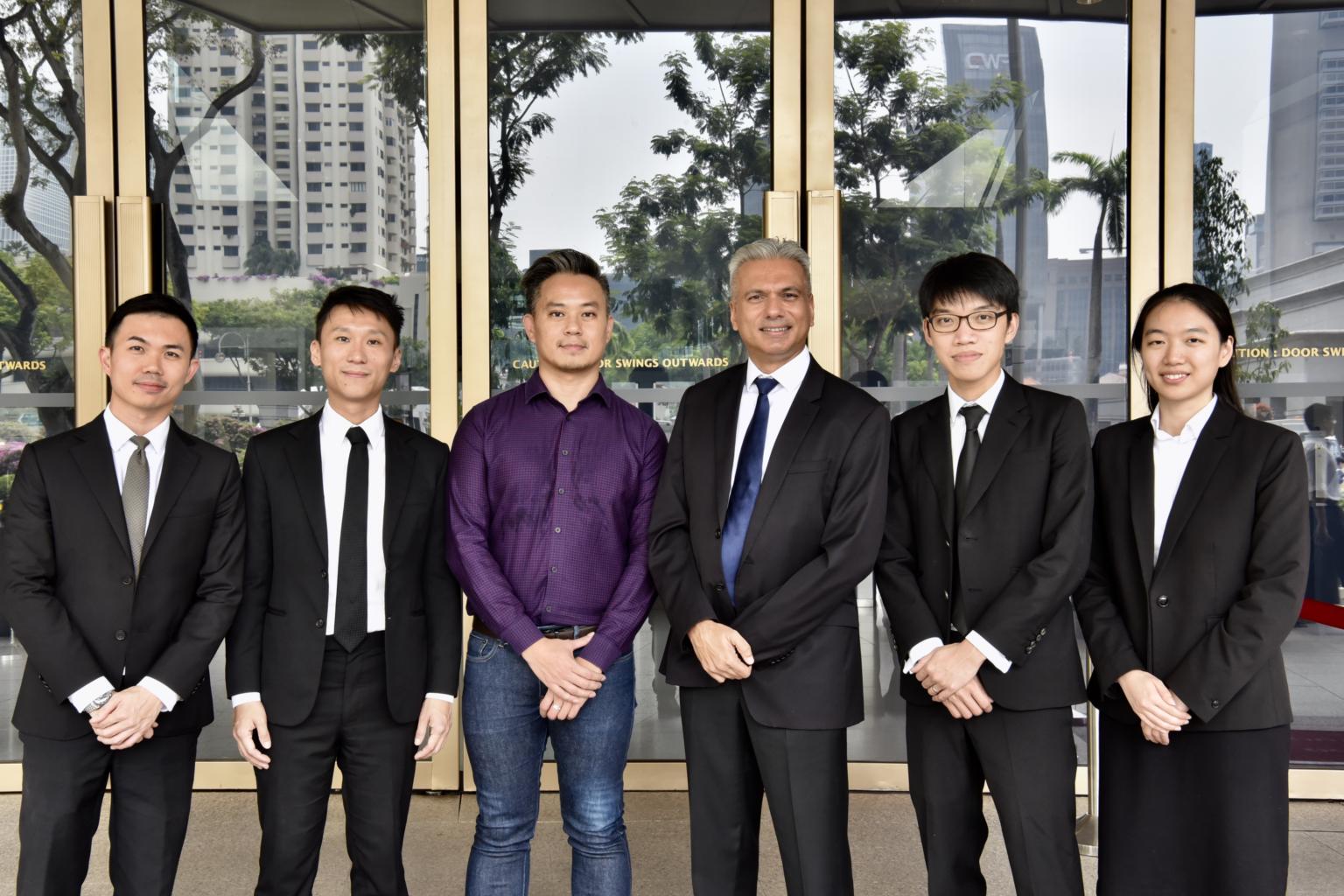Section 377A was intended to stop British civil servants visiting male prostitutes: Lawyers
Sign up now: Get ST's newsletters delivered to your inbox

Mr Bryan Choong Chee Hong (in purple) with his lawyers, (from left) Mr Jordan Tan, Mr Remy Choo Zheng Xi, and Senior Counsel Harpreet Singh Nehal, who are assisted by Mr Wong Thai Yong and Ms Priscilla Chia Wen Qi.
PHOTO: CHING S. SIA
SINGAPORE - Section 377A of the Penal Code was originally intended to curtail the spread of male prostitution, not consensual private sexual acts between men, lawyers arguing for the law to be repealed said.
It also was not intended to criminalise penetrative sex, which was covered under Section 377, a separate law that was repealed in 2007, they added.
On top of that, the law violates parts of the Singapore Constitution that guarantee equality before the law and freedom of expression, the lawyers said.
The legal team, consisting of Senior Counsel Harpreet Singh Nehal of Audent Chambers, Mr Jordan Tan of Cavenagh Law and Mr Remy Choo Zheng Xi, Mr Wong Thai Yong and Ms Priscilla Chia Wen Qi of Peter Low & Choo, were in the High Court on Wednesday (Nov 13) to present arguments in the first of three cases to be brought against Section 377A.
They represent Mr Choong Chee Hong, 42, better known as Bryan Choong, who is the former executive director of lesbian, gay, bisexual and transgender (LGBT) non-profit Oogachaga.
The arguments were heard by Justice See Kee Oon in chambers on Wednesday.
In making their case, the lawyers echoed former chief justice Chan Sek Keong's opinion on Section 377A as laid out in a 72-page article published last month in the Singapore Academy of Law Journal.
Section 377A targeted prostitution, not private sex acts
The team submitted documents from the British National Archives that were declassified in 2014 and 2016 to bolster their argument on the original purpose of Section 377A.
The documents, correspondence between the colonial authorities in the Straits Settlements and government officials in Britain dating back to 1938, show that male prostitution was a widespread problem in the area at the time, especially among British civil servants, they argued.
Section 377A was passed in the Legislative Council of the Straits Settlements to combat this problem and later inherited by Singapore, the lawyers said.
They also noted that the full text of Section 377A covers not only those who commit acts of "gross indecency" but also any male person who "abets the commission of, or procures or attempts to procure the commission by any male person of" such acts.
This is consistent with the view that Section 377A's purpose was to deal with prostitution as it would thereby cover pimps and traffickers, the lawyers added.
They added that these documents were not considered by the Court of Appeal when it dismissed another case against the constitutionality of Section 377A brought by Mr Lim Meng Suang in 2015.
Section 377A did not cover penetrative sex
The lawyers also cited a speech by then Attorney-General Charles Gough Howell to the Legislative Council of the Straits Settlements in 1938 to support the argument that the law did not cover penetrative sex, only non-penetrative acts of "gross indecency".
In his speech arguing that it was necessary to introduce Section 377A, Attorney-General Howell had said: "As the law now stands, such acts can only be dealt with, if at all, under the Minor Offences Ordinance, and then only if committed in public."
The lawyers said penetrative sex was already covered under Section 377, which carried a heavier sentence of up to 10 years' jail and a fine. There would be no legislative purpose served by Section 377A in punishing penetrative sex with a lighter sentence of up to two years' jail and no fine, they added.
They said previously unavailable colonial documents submitted to the court also show that Section 377 was the law used to press charges in cases of penetrative sex, even when male prostitutes were involved.
Section 377A violates Articles 12 and 14 of the Constitution
The team also argued that Section 377A is incompatible with Article 12 of the Constitution, which guarantees equality before the law, and Article 14, which guarantees freedom of expression.
They noted that Article 12 requires a discriminatory law to be based on an "intelligible differentia" which distinguishes those who are covered under the law from those who are not. The differentia also has to have a rational relation to the objective of the law in question.
But the lawyers argued that even if the court accepts that the difference between gay men and straight men is an intelligible differentia, this has no rational relation to the intent of targeting commercial sex.
They also cited rulings by courts outside of Singapore, including those in Canada, Belize, India, Trinidad and Tobago, Botswana and Hong Kong, that ruled that sexual intimacy is a form of free expression.
Article 14 of the Constitution allows for laws to restrict freedom of expression, but it stipulates that only the Parliament of Singapore is empowered to introduce such laws, the lawyers said.
As pre-independence laws like Section 377A were not passed by Singapore's Parliament, they cannot fall within the scope of this exception, the team said.
Two other cases against Section 377A will be heard in the High Court this month, including one brought by disc jockey Johnson Ong Ming and another brought by veteran LGBT activist and retired general practitioner Tan Seng Kee, also known as Roy Tan.
The hearing was adjourned and will continue on Friday.


